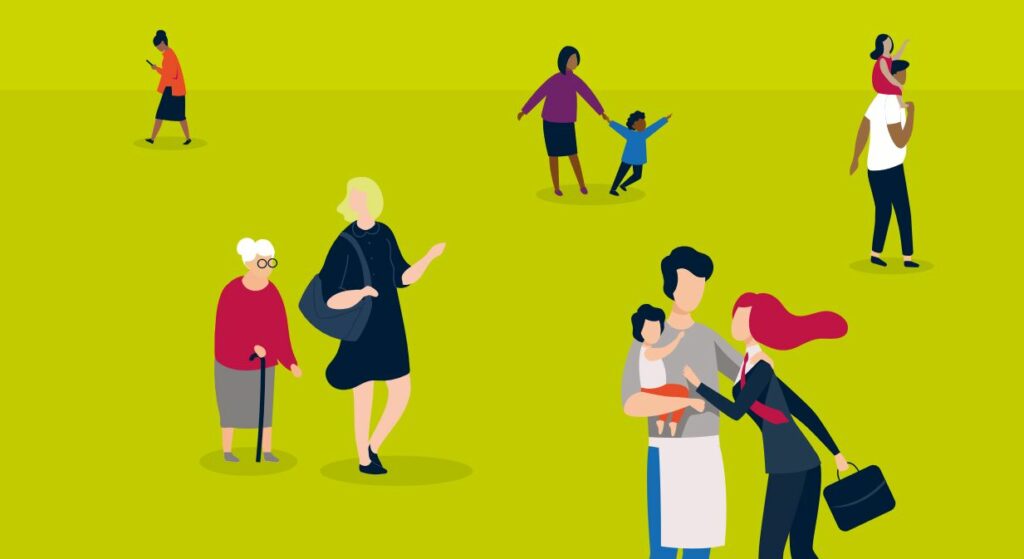Turning words into deeds: Diversity & Inclusion in practice at Cardano
A recent Cardano policy document claims that “diversity, equity and inclusion are at the core of our culture and how we run our business. We aspire to be a truly diverse, fair and inclusive business with the right talent to deliver the best possible results for our clients and to reflect the society we serve. We aim to achieve diversity across all dimensions and to make the Cardano Group a truly great place to work, where all of us can thrive and contribute to our success and where we all feel a sense of belonging.”
But what does this actually mean in practice? What action are we taking to achieve these aims? What targets have we set ourselves and are we on track to reach them?
Everyone’s responsibility
At the same time, it’s not simply a matter of following a CEO’s instructions. While it remains crucial that management is on board, a key pillar of our D&I strategy is to ensure that each and every employee feels a sense of belonging, feels valued and heard, and knows that their opinion counts. We cannot achieve our ambitions unless we bring everyone along on the journey and show that D&I is everybody’s responsibility.
In the awareness that every single member of staff needs to be involved, the next step is to decide how we can achieve our aims of making the Cardano Group an inclusive workplace. This means taking action to make sure everyone has equal opportunities to succeed, irrespective of their gender, race, sexuality or gender reassignment, age, physical or mental disability, religious beliefs, marital status or socio-economic background.
Steering Committee and networks
We believe that the composition of our staff should reflect the society we serve. We also value diversity in background and thinking because it leads to better decision-making and risk management. We aim to provide a safe working environment for all and have zero tolerance to any form of prejudice or discrimination. To this end, we have formed a Diversity & Inclusion Steering Committee and a number of Employee Resource Groups:
- Gender Inclusion Network
- BAME Network
- Working Parents and Carers Network
- Pride Network
- Health and Wellbeing Network
Our networks are the key to our identity as an inclusive place to work. Members arrange events, identify areas for improvement and focus on what’s important to them, working together to raise awareness around challenges that underrepresented groups might face. Our Diversity & Inclusion Steering Committee works with the resource groups to assimilate our activities and timetables across the Group.
As an example, the Gender Inclusion Network recently did a number of activities around working with females in the pensions industry. The BAME Network was involved in an event called Classroom to Boardroom, which was about young people coming into the business. We were also one of the first companies to join the Hundred Black Interns initiative, which is especially for the investment management industry: we’ve got three interns coming this summer.
Part of making sure that people feel a sense of belonging is getting people to really work together on projects. This is something that these employee resource groups are now doing. We recently did a Return to the Office Project, a smart project about collaborative working and working two days in the office, three days at home. There were people from all four Cardano businesses working on this project.
We value diversity in background and thinking because it leads to better decision-making and risk management.
Recruitment and promotion
We are committed to reducing inequalities across all groups and promoting a better balance in Cardano at all levels. We continue to review our recruitment and promotion practices and focus on the development of our internal female and BAME talent pipeline. We are also working hard to appoint more women and BAME colleagues in graduate trainee positions.
Recruitment is where it all begins. We have adopted blind CVs in our hiring process. We look at the language we use in our job advertisements. We have updated our website to improve its accessibility and use social media channels to advertise career opportunities more widely.
The next step is all about adopting an appropriate HR strategy. We constantly review our family-friendly policies including those on maternity, paternity and flexible working. Recognising that accountability and transparency are key to progression, we are reviewing our compensation process and have voluntarily completed a gender pay gap report for 2020 which highlights our current performance and sets out the steps we are taking to improve the progression of our female employees.
Learning and development
Our people strategy is focused on building an environment in which every employee can thrive and reach their potential. We have created a culture of continuous development, identifying future leaders, providing career progression and career paths. We have introduced a new graduate programme to build a high-quality pipeline of diverse talent. We also encourage and sponsor our employees to take business-relevant qualifications and to take on further education.
We run leadership programmes across the Group to develop our talent and build a strong pipeline of leadership. We also encourage lateral movement across the Group, where relevant, and review this through our diversity lens.
Health and wellbeing
In addition to supporting the professional development of our staff, we have a role to play in supporting their mental wellbeing. We recognise the importance of an appropriate work-life balance, both to the health and wellbeing of employees and to the business. We have reviewed our flexible working policy to allow individuals to manage their work-life balance. Given the importance of our employees’ wellbeing, we have introduced trained mental health first aiders across the businesses who are available to all our employees, helping those who need support or have mental health concerns. We recently increased the range and number of training and guidance information on wellbeing-related topics, including resilience training, tips for working remotely and how to protect mental health.
Mentoring for senior female leaders
We are supporting and developing our female employees through a Board Mentoring scheme which will be rolled out to other employees in the second half of 2021. Under the scheme, each management board member mentors a number of senior female staff. It’s very much a two-way thing: partly, it’s about female staff acquiring greater visibility and understanding the business, but also it’s about the management board understanding some of the challenges facing female employees.
Holding ourselves accountable
Historically, women and members of BAME and LGBTQ groups have been less well represented at all levels in our industry. Addressing this imbalance is a key priority. We are committed to making sure our actions match our words. We want to hold ourselves accountable and firmly embed a culture of ‘everyone matters’. We have set ourselves a clear set of targets to achieve by 2025. While we are very proud of the work we have done so far, we know that there is much more to be done.
As part of our five-year Diversity and Inclusion strategy, we plan to:
- expand our Board mentoring scheme in 2021;
- achieve the following goals for the representation of women and BAME colleagues:
- 40% of the staff of each business unit to consist of women by 2025;
- 10% of the staff of each business unit to consist of employees from a BAME background by 2025;
- 30% of partners to be female by 2025;
- 10% of partners to be from a BAME background by 2025;
- work on an internal data gathering programme to allow us to undertake ethnicity pay gap reporting by 2023;
- expand the scope of our employee resource groups;
- produce a gender pay gap report for each business unit for the 2021 reporting year;
- increase female representation in our annual graduate intake (to exceed 50%).
Measuring progress
We believe it is important to measure our progress wherever possible – including by collecting diversity profile data, tracking participation in development programmes and promotions and holding our senior leaders accountable for improving our diversity representation at all levels of the organisation.




